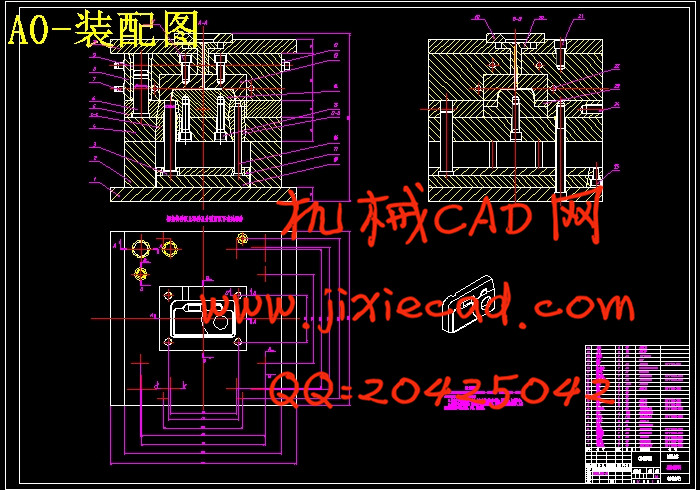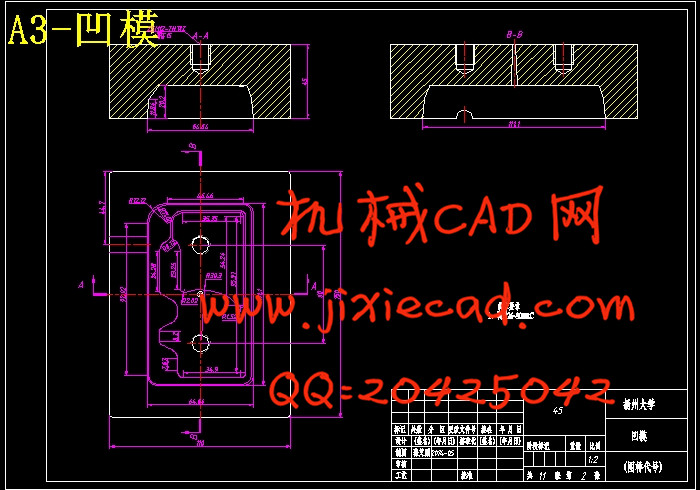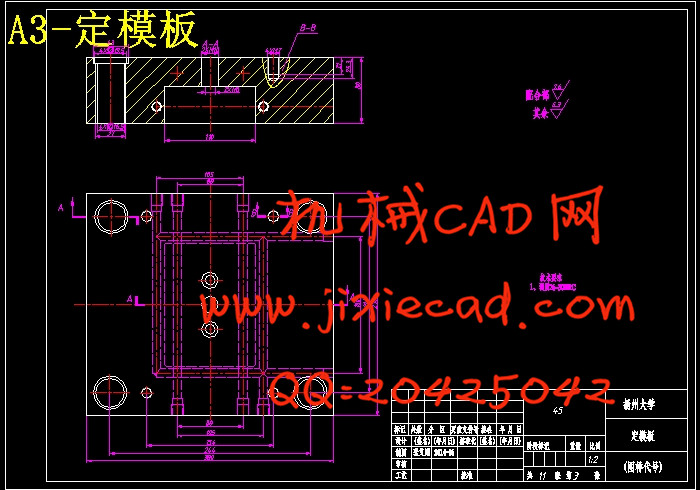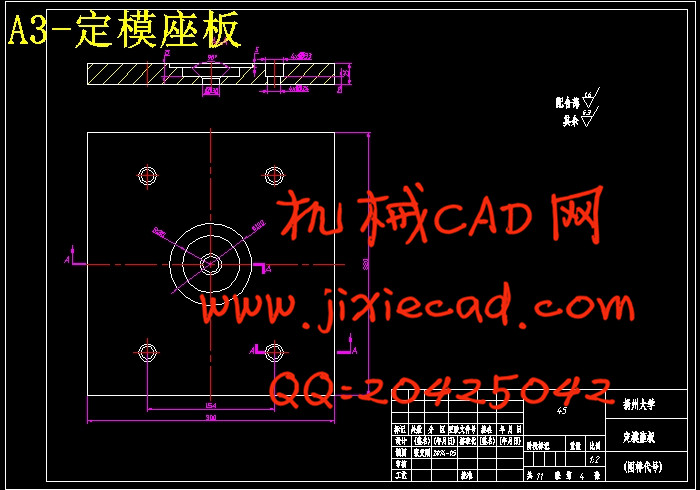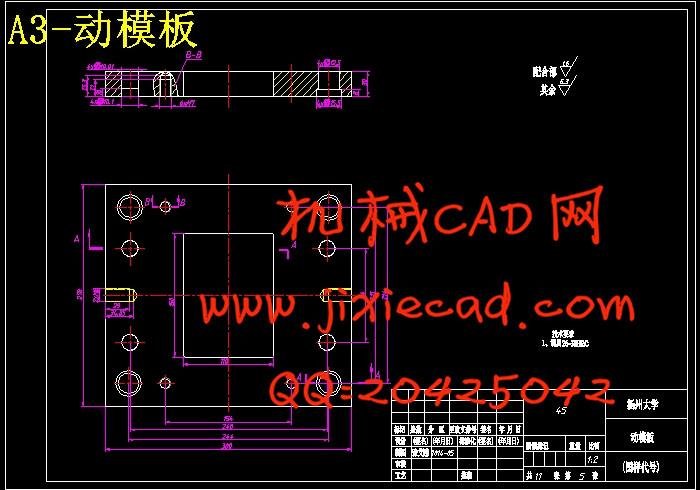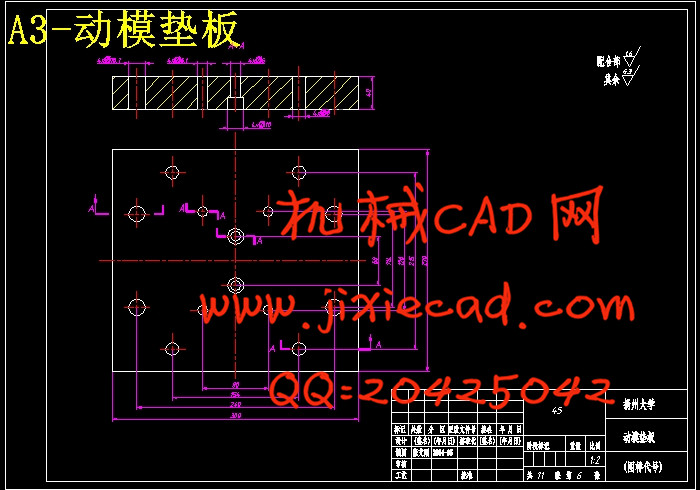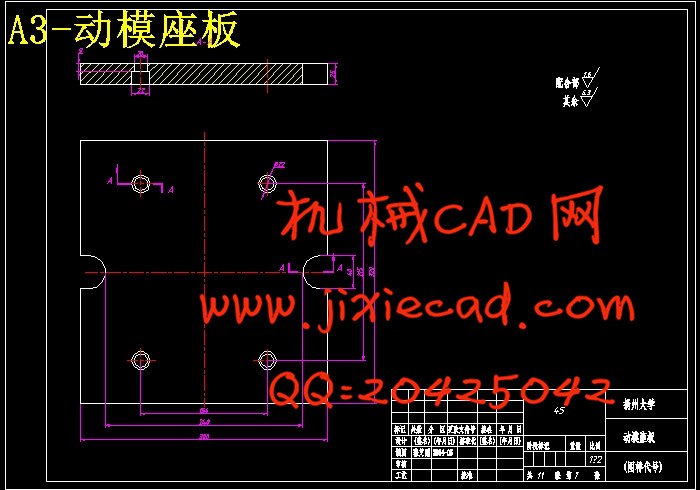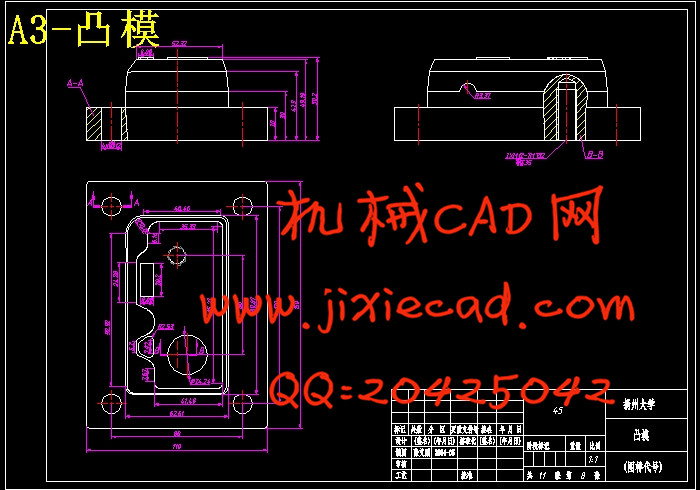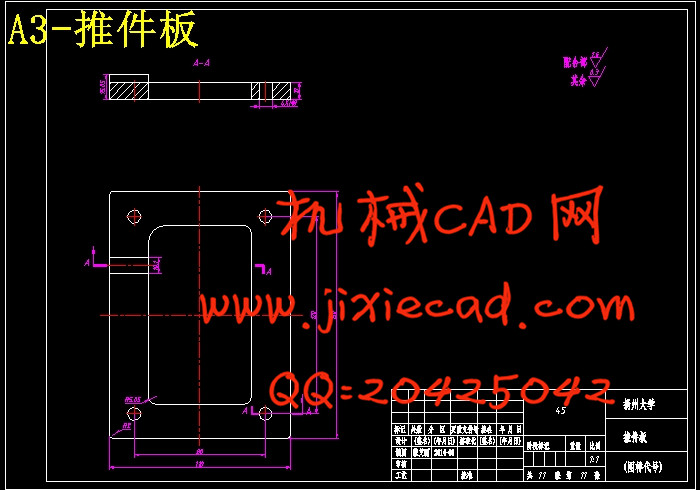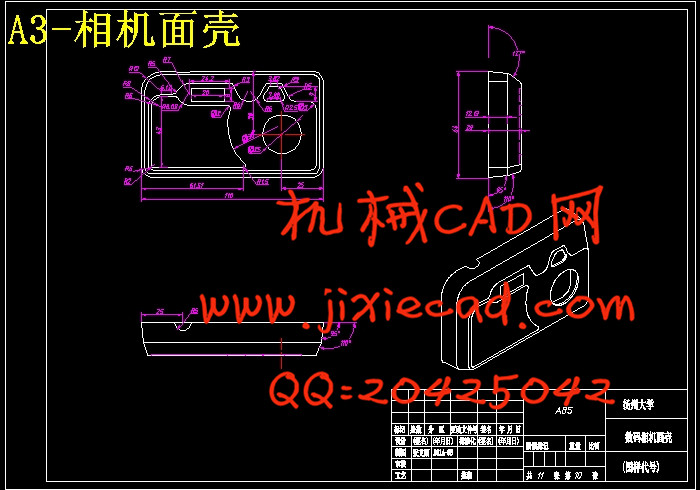设计简介
摘 要
本文主要讲述对数码相机面壳进行模具设计的过程,通过对塑件的工艺分析,设计出塑料模具,并通过对模具设计与分类信息及产品材料的性能分析,初步选择注塑机。
这次设计是对数码相机面壳的注射模进行了设计研究。该塑件成品的表面要求一般沙面,但要求耐老化耐磨损,使用寿命较长。故在设计中选ABS(丙烯腈-丁二烯-苯乙烯共聚物),潜浇口以保证其外观要求。由于塑件有较复杂外形轮廓及内部结构,产品倒钩距离较长需做油缸斜抽芯,对模具结构型腔排布的限制和生产数量等生产成本综合考虑,确定在该设计中,型芯型腔为便于加工尽量使用镶嵌件,以减少生产成本,保证塑件制品的加工成型精度。同时,本设计在模具结构细节和其他动作原理方面作了较为详细的解释说明。最后结合模具的结构和标准零件的选用完成了整套模具的装配,对有关技术规范进行了全面校核,确保所设计的模具结构合理并能安全可靠的用于批量生产。本设计阐述了结合使用 Pro/E,AutoCAD 完成装配图,零件图。
关键词:数码相机面壳,Pro/E,塑料模具,设计
Abstract
This paper focuses on the process of mold design of digital camera shell, through process analysis of plastic parts, design of plastic mold, and the performance of the die design and classification of information and material analysis, the preliminary selection of injection molding machine.
The injection mold is designed for digital camera shell was designed. The surface of the plastic product general requirements of sand, but aging resistance abrasion resistance, long service life. B. ABS in the design, to ensure the appearance of latent gate. Because the plastic parts with complex shape and internal structure, product barb longer need cylinder angle core pulling, limit the production quantity and production cost of mould structure cavity layout consideration, determined in the design, core and cavity to facilitate processing as far as possible the use of mosaic pieces, reduces the production cost, to ensure the machining precision of plastic products. At the same time, the design of the die structure details and other operation principle in detail explanation. Finally, the structure and mold standard parts to complete the assembly die package, on the relevant technical specifications and conducted a comprehensive check, to ensure that the design is reasonable and can be safely used for mass production. Described the design of the combined use of Pro/E, AutoCAD to complete the assembly diagram, parts diagram.
Keywords: digital camera shell, Pro/E, plastic mould, design
目 录
摘要
Abstract
第一章 绪论 II
1.1模具及模具工业的发展与现状 1
1.2塑料成型模具的种类 2
1.3注射模具的发展方向 2
第二章 塑料成型工艺 4
2.1 塑件材料的选择 4
2.2确定成型方法 4
2.3注塑成型工艺过程 4
2.3.1 成型前的准备 5
2.3.2 注塑成型过程 5
2.3.3、塑件的后处理 6
2.4塑件的结构工艺性 7
2.5 塑件成型工艺参数 7
2.5.1 温度 8
2.5.2 压力 8
2.5.3 成型周期 9
第三章 数码相机面壳模具设计 10
3.1注塑模具分类及典型结构 10
3.1.1注塑机机构组成 10
3.1.2 注塑机分类 11
3.1.3 注塑机的型号规格 11
3.2注塑模具分类及典型结构 12
3.2.1注射模分类 12
3.2.2注射模典型结构 13
3.3数码相机面壳模具的结构设计 15
3.3.1确定分型面位置 15
3.3.2确定型腔数量 15
3.3.3 浇注系统设计 16
3.3.4 成型零件设计 17
3.3.5 合模导向机构设计 19
3.3.6 推出机构设计 20
3.3.7 模具温度调节系统设计 23
3.3.8 标准模架的选用 23
3.3.9 模架的尺寸计算 24
3.4 注射模具与注射机的关系 26
3.4.1 选择注塑机 26
3.4.2最大注射量的校核 27
3.4.3 注射压力的校核 28
3.4.4 锁模力的校核 29
3.4.5 安装部分尺寸校核 29
3.4.6 开模行程的校核 29
3.4.8 推出装置的校核 29
第四章 数码相机面壳模具三维设计 30
4.1数码相机面壳三维造型及模具设计 30
4.2 模架设计 31
4.2.1 定义模具模架 32
4.2.2 添加设备 33
4.2.3 设计顶出机构 34
4.2.4 设计冷却系统 34
4.2.5 动画模拟开模 36
第五章 数码相机面壳模具注射仿真分析 37
5.1 Pro/e塑料顾问的简介 37
5.2 塑料顾问模块的进入 37
5.3 分析功能应用 38
5.4 分析结果 39
5.5分析结果的输出 41
5.6 注射仿真分析的优缺点 42
第六章 小结与展望 43
6.1小结 43
6.2展望 43
致 谢 44
参考文献 45
本文主要讲述对数码相机面壳进行模具设计的过程,通过对塑件的工艺分析,设计出塑料模具,并通过对模具设计与分类信息及产品材料的性能分析,初步选择注塑机。
这次设计是对数码相机面壳的注射模进行了设计研究。该塑件成品的表面要求一般沙面,但要求耐老化耐磨损,使用寿命较长。故在设计中选ABS(丙烯腈-丁二烯-苯乙烯共聚物),潜浇口以保证其外观要求。由于塑件有较复杂外形轮廓及内部结构,产品倒钩距离较长需做油缸斜抽芯,对模具结构型腔排布的限制和生产数量等生产成本综合考虑,确定在该设计中,型芯型腔为便于加工尽量使用镶嵌件,以减少生产成本,保证塑件制品的加工成型精度。同时,本设计在模具结构细节和其他动作原理方面作了较为详细的解释说明。最后结合模具的结构和标准零件的选用完成了整套模具的装配,对有关技术规范进行了全面校核,确保所设计的模具结构合理并能安全可靠的用于批量生产。本设计阐述了结合使用 Pro/E,AutoCAD 完成装配图,零件图。
关键词:数码相机面壳,Pro/E,塑料模具,设计
Abstract
This paper focuses on the process of mold design of digital camera shell, through process analysis of plastic parts, design of plastic mold, and the performance of the die design and classification of information and material analysis, the preliminary selection of injection molding machine.
The injection mold is designed for digital camera shell was designed. The surface of the plastic product general requirements of sand, but aging resistance abrasion resistance, long service life. B. ABS in the design, to ensure the appearance of latent gate. Because the plastic parts with complex shape and internal structure, product barb longer need cylinder angle core pulling, limit the production quantity and production cost of mould structure cavity layout consideration, determined in the design, core and cavity to facilitate processing as far as possible the use of mosaic pieces, reduces the production cost, to ensure the machining precision of plastic products. At the same time, the design of the die structure details and other operation principle in detail explanation. Finally, the structure and mold standard parts to complete the assembly die package, on the relevant technical specifications and conducted a comprehensive check, to ensure that the design is reasonable and can be safely used for mass production. Described the design of the combined use of Pro/E, AutoCAD to complete the assembly diagram, parts diagram.
Keywords: digital camera shell, Pro/E, plastic mould, design
目 录
摘要
Abstract
第一章 绪论 II
1.1模具及模具工业的发展与现状 1
1.2塑料成型模具的种类 2
1.3注射模具的发展方向 2
第二章 塑料成型工艺 4
2.1 塑件材料的选择 4
2.2确定成型方法 4
2.3注塑成型工艺过程 4
2.3.1 成型前的准备 5
2.3.2 注塑成型过程 5
2.3.3、塑件的后处理 6
2.4塑件的结构工艺性 7
2.5 塑件成型工艺参数 7
2.5.1 温度 8
2.5.2 压力 8
2.5.3 成型周期 9
第三章 数码相机面壳模具设计 10
3.1注塑模具分类及典型结构 10
3.1.1注塑机机构组成 10
3.1.2 注塑机分类 11
3.1.3 注塑机的型号规格 11
3.2注塑模具分类及典型结构 12
3.2.1注射模分类 12
3.2.2注射模典型结构 13
3.3数码相机面壳模具的结构设计 15
3.3.1确定分型面位置 15
3.3.2确定型腔数量 15
3.3.3 浇注系统设计 16
3.3.4 成型零件设计 17
3.3.5 合模导向机构设计 19
3.3.6 推出机构设计 20
3.3.7 模具温度调节系统设计 23
3.3.8 标准模架的选用 23
3.3.9 模架的尺寸计算 24
3.4 注射模具与注射机的关系 26
3.4.1 选择注塑机 26
3.4.2最大注射量的校核 27
3.4.3 注射压力的校核 28
3.4.4 锁模力的校核 29
3.4.5 安装部分尺寸校核 29
3.4.6 开模行程的校核 29
3.4.8 推出装置的校核 29
第四章 数码相机面壳模具三维设计 30
4.1数码相机面壳三维造型及模具设计 30
4.2 模架设计 31
4.2.1 定义模具模架 32
4.2.2 添加设备 33
4.2.3 设计顶出机构 34
4.2.4 设计冷却系统 34
4.2.5 动画模拟开模 36
第五章 数码相机面壳模具注射仿真分析 37
5.1 Pro/e塑料顾问的简介 37
5.2 塑料顾问模块的进入 37
5.3 分析功能应用 38
5.4 分析结果 39
5.5分析结果的输出 41
5.6 注射仿真分析的优缺点 42
第六章 小结与展望 43
6.1小结 43
6.2展望 43
致 谢 44
参考文献 45


